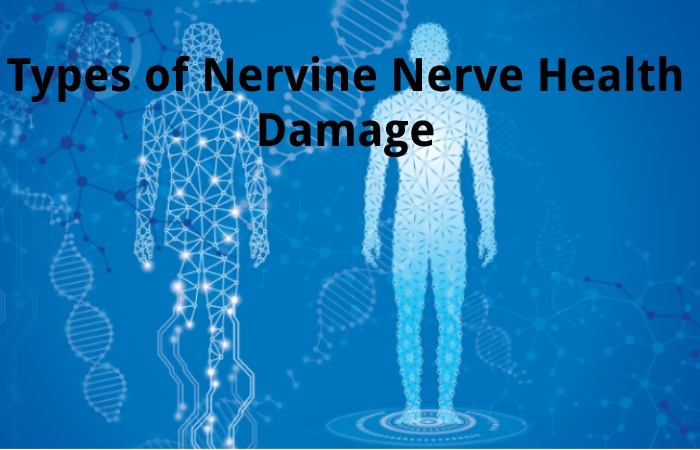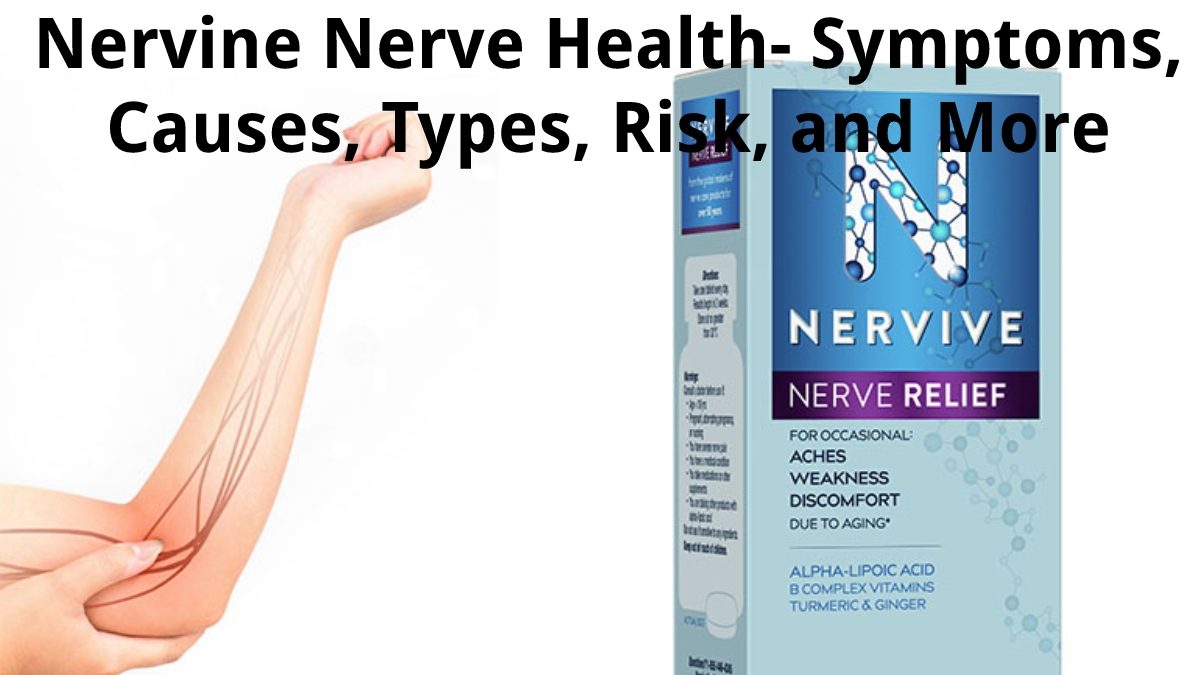Table of Contents
Nervine Nerve Health
Nervine nerve health contains B vitamins and Alpha lipoic acid. These B vitamins support critical components of your nerve health, generating energy (B1), maintaining healthy nerve communication (B6), and building myelin (B12). Alpha lipoic acid works by improving healthy blood flow and providing antioxidant activity. However, high blood sugar can lead to nerve damage called diabetic neuropathy. You can prevent or slow its progress by keeping your blood sugar as close to your target range as possible and maintaining a healthy lifestyle.
Pain and Damage of Nervine Nerve Health
Your nervous system is complex in everything your body does, from modifiable breathing to controlling your powers and sensing temperature and emotionless.
There are three kinds of worries in the form:
Autonomic doubts: These worries switch the instinctive or partially voluntary activities of your body, including heart rate, blood pressure, digestion, and temperature directive.
Motor nerves control actions and actions by passing information from your brain and back cord to your strengths.
Sensory nerves relay data from your skin and muscles to your spinal cord and brain. The data is then processed to let you feel pain and other sensations.
What Are the Symptoms of Pain and Damage Nervine Nerve Health?

With nerve injury, there can be a comprehensive collection of symptoms. Which ones you may have are contingent on the site and the type of pretentious nerves. Damage can happen to nerves in your brain and back cord and can also occur in the peripheral nerves. And also, In which are located through the break of your form.
Autonomic nerve damage may crop the following symptoms:
- Incapacity to brain trunk pain, such as angina or heart attack
- Too much diaphoresis (known as hyperhidrosis) or too little diaphoresis (known as anhidrosis)
- Light-headedness
- Dry eyes and mouth
- Constipation
- Bladder dysfunction
- Sexual dysfunction.
Damage to motor worries may produce the following symptoms:
- Weakness
- Muscle atrophy
- Twitching, also known as fasciculation
- Paralysis.
What Causes Nervine Nerve Health Pain besides Harm?
There are additional than 100 different types of nerve harm. And also, The many types may have other symptoms and require different treatment types. And also, It is estimated that near 20 million Americans suffer from peripheral nerve damage. While not an exhaustive list, the following are some of the possible causes of nerve pain and nerve damage:
Autoimmune diseases: A variety of autoimmune diseases can produce nerve pain and nerve damage symptoms. These include multiple induration, Guillain-Barré syndrome (a rare condition in which the immune system attacks the peripheral nerves), lupus, and seditious bowel illness.
Cancer: Cancer can reason nerve pain and nerve damage in manifold ways. And also, In some instances, cancerous crowds may push against or crush nerves. And also, In other bags, certain types of cancer may result in nutrition deficiencies that affect nerve function. Moreover, some types of chemotherapy and radiation may produce nerve pain and nerve damage in specific persons.
Compression/trauma: Anything that consequences in trauma or reduction of nerves container result in nerve pain and nerve damage. And also, comprises pinched worries in the neck, crush injuries, and carpal tunnel syndrome. Learn more about pinched (compressed) nerves.
Diabetes: Up to 70% of individuals with diabetes suffer from nerve harm, which becomes more likely as the disease progresses. Diabetic neuropathy is a severe complication and may affect all three types of neurons. However, sensory nerves are most often affected, causing burning or numbness. And also, if you have diabetes and are experiencing nerve pain or nerve damage symptoms.
Motor neuron illnesses: The motor neurons are nerves in your mind and spinal pillar that communicate with the muscles throughout your body. And also, Conditions that affect these nerves, including amyotrophic lateral sclerosis, also called ALS or Lou Gehrig’s disease, can consequence in progressively deteriorating nerve damage. And also, Read more on the different types of motorized nerve cell diseases.
Nutritional deficiencies: Deficiencies of certain nutrients, including vitamins B6 and B12, may crop symptoms of nerve pain and nerve damage, counting weakness or red-hot sensations. Nutritional deficiencies that cause nerve harm may also result from unnecessary alcohol absorption or develop after intestinal surgery. And also, See a list of food foundations of vitamins and minerals.
Symptoms of Nervine Nerve Health
Every nerve in your remote system has a specific function, so indications are contingent on the nerves affected. Nerves are classified into:
- Sensory nerves that receive sensation, such as fever, pain, vibration or touch, from the casing
- Motor nerves that control muscle drive
- Autonomic nerves regulate functions such as blood weight, sweat, heart rate, digestion and bladder.
Signs and symptoms of marginal neuropathy might include:
- Gradual onset of numbness, prickling or tingling in your feet or hands, which can spread upward into your legs and arms
- Sharp, jabbing, throbbing or burning pain.
Extreme Sensitivity to Touch
Pain during activities that shouldn’t cause pain, such as pain in your feet when putting weight on them or when they’re under a blanket
- Nonexistence of direction and falling
- Muscle weakness
- Feeling as if you’re wearing handbags or socks when you’re not
- Paralysis if motor nerves are affected
- If autonomic nerves are exaggerated, signs and symptoms power include:
- Heat intolerance
- Excessive diaphoresis or not being able to sweat
- Bowel, bladder or digestive problems
- Drops in blood pressure cause giddiness or lightheadedness.
Types of Nervine Nerve Health Damage

There are four main types of nerve injury. However, you can have more than one type; symptoms depend on your nerve damage and which nerves are affected.
Peripheral Nerve Damage
Have you felt “pins and pointers” or prickly in your feet? Perhaps you feel like you’re wearing socks or ornaments when you aren’t. Your feet may be susceptible to touch, and even a bed sheet can upset them. And also, These are all indications of peripheral nerve damage. Peripheral nerve injury affects your hands, feet, legs, and arms, and it’s the most shared type of nerve injury for people with diabetes. And also, It usually starts in the feet, usually in together feet at once.
Other symptoms may include:
- Pain or increased sympathy, especially in the evening.
- Numbness or Weakness.
- Series foot difficulties include ulcers, infections, and bone and joint pain.
Autonomic Nerve Damage
Autonomic nerve damage affects your sentiment, bladder, stomach, intestines, sex tissues, or eyes. Symptoms may include:
- Bladder or bowel problems may cause urine escape, constipation, or diarrhoea.
- Nausea, loss of craving, and vomiting.
- Changes in how your eyes alter from light to shady.
- Decreased sexual response, including trouble receiving an erection in males or vaginal aridness in females.
Proximal Nerve Damage
Proximal nerve damage touches nerves in the thighs, hips, buttocks, or limbs. And also, It can also affect the stomach and torso area. Indications may comprise:
- Severe discomfort in a hip and thigh or buttock.
- Worry getting up from a sedentary location.
- Severe front pain.
Focal Nerve Damage
Focal nerve harm affects sole nerves, most often in your hand, head, torso, or leg. Symptoms may include:
- Trouble focusing your vision or having double vision.
- Aches late one eye.
- Not being able to move one cross of your face (Bell’s palsy).
- Numbness or tingling in your hands or limbs.
- Weakness in your hand that may make you drop things.
- Make a note if you have any of these indications and share them with your doctor.
Risk Factors for Nerve Damage
Anybody with diabetes can grow nerve damage, but these issues increase your risk:
- Plasma darling levels are hard to manage.
- You have had diabetes for an extended time, especially if your blood sugar is often higher than your target levels.
- It is being overweight.
- They were older than 40.
- I had high blood pressure.
- I have high cholesterol.
Conclusion
Nerve damage is one possible complication of having high blood sugar stages for a long time. High blood sugar compensations for your nerves. And also, In you may stop sending emails to different parts of your body. Nerve damage can cause health problems reaching from mild numbness to pain, making it hard to do everyday doings. And also, Semi of all people with diabetes has nerve damage.

